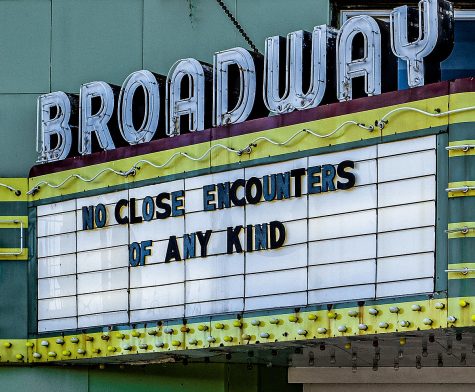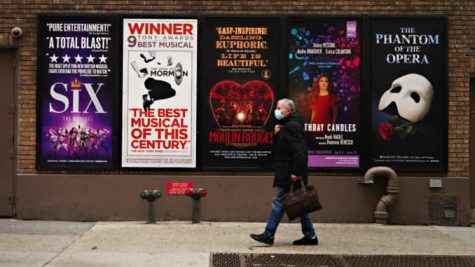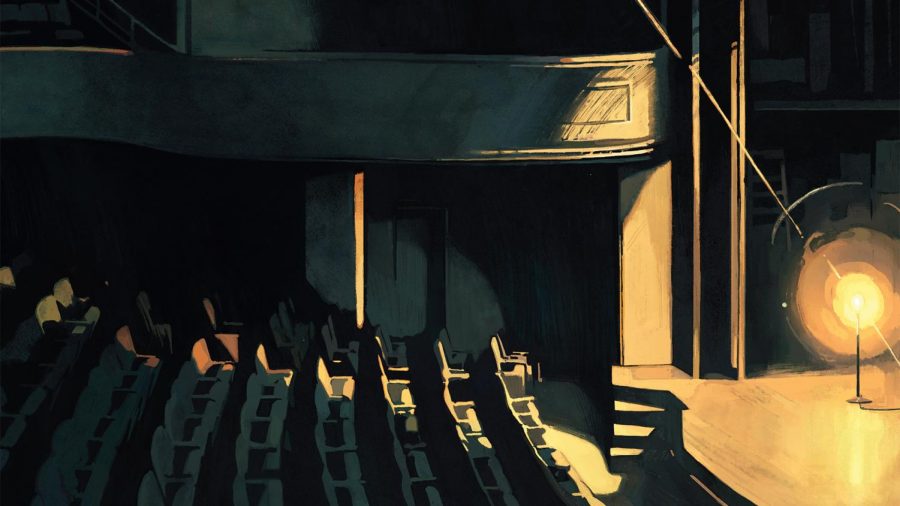Broadway and COVID-19
As a lifelong musical theater fan, the last year has been frustrating, to say the least. With Broadway, the global center of theater production, closed for over a year, the theater creation has slowed down immensely. The quarantine has been filled with disappointing news from the theater world; the closing of beloved shows such as Mean Girls and Beetlejuice and repeated reopening delays have made many pessimistic about the near future of Broadway. But hope seems to be on the horizon. With vaccines rolling out throughout the country and many areas reopening due to low infection rates, can we finally expect a return to the normal pre-Covid theater experience?
The answer is complicated. First of all, even if restrictions are completely lifted, it will take a while for theaters to get back to running as usual. Live theater takes a lot of work to run, and shows will need several months of rehearsal to return to their normal state. Another consideration is safety protocols. While the spread of COVID-19 has slowed, it is not completely over, and there are new precautions to take into account before reopening shows. In addition, many regular audience members, especially tourists, may not yet feel comfortable travelling or seeing shows even after the city reopens.
 Secondly, many changes have occurred within theater politics since Broadway was last open. From Black Lives Matter to the Stop Asian Hate, quarantine has given space for much needed conversations about social issues, and theater communities have been equally affected by these discussions. In the wake of the Black Lives Matter protests last summer, many theater creators and companies made commitments to uplift minority voices, in large step in a historically exclusionary art form. Shows like A Strange Loop, a Black and queer-led musical which won the Pulitzer Prize for drama in May, demonstrate the potential for inclusive stories told in a theater format, but it is yet to be seen how much Broadway will live up to its promises of providing similar shows for a more mainstream audience. Hopefully, Broadway producers will keep inclusivity in mind when deciding the new season.
Secondly, many changes have occurred within theater politics since Broadway was last open. From Black Lives Matter to the Stop Asian Hate, quarantine has given space for much needed conversations about social issues, and theater communities have been equally affected by these discussions. In the wake of the Black Lives Matter protests last summer, many theater creators and companies made commitments to uplift minority voices, in large step in a historically exclusionary art form. Shows like A Strange Loop, a Black and queer-led musical which won the Pulitzer Prize for drama in May, demonstrate the potential for inclusive stories told in a theater format, but it is yet to be seen how much Broadway will live up to its promises of providing similar shows for a more mainstream audience. Hopefully, Broadway producers will keep inclusivity in mind when deciding the new season.
A more recent Broadway-centric controversy surrounds Scott Rudin, a large Broadway producer who just last month faced accusations of physical and emotional abuse from actors and other employees who had worked under him. This controversy has sparked questions about the culture fostered in Broadway workplaces which allowed this abuse to take place. Since the news, many fans have expressed outrage against the silence of many theater professionals about the issue. Tensions over these two issues culminated in the March on Broadway on April 22, where fans and artists came together to articulate demands for Broadway to increase diversity and accountability in its productions. In light of these ongoing discussions, many see it as irresponsible for Broadway to return to business as usual without addressing these matters.
 Despite the closure of Broadway, theater production over the past year has not completely stopped. In fact, the closure of live theater has, in many ways, paved the way for a more accessible theater world moving forward. Due to the location specific nature and the high cost of tickets, the theater art form has historically been rather difficult to access for many who would otherwise enjoy it. The sudden lack of live theater due to quarantine allowed for the practical implementation of more accessible ways to consume theater. In the early months of lockdown, many famous theater writers such as Andrew Lloyd Webber and Dave Malloy released free or low priced recordings of their musicals. The quarantine also prompted Disney+ to release Hamilton a year earlier than intended, an unprecedented move for such a popular musical. The lack of theater content over this period has also produced an outgrowth of creativity from more grassroots sources. The Ratatouille musical, which started as a joke on TikTok, gained enough traction to become a real live-streamed musical with famous Broadway performers. Starkid, a production company known for its pioneering use of the internet to create a community around accessible theater content, has also experimented with live-streaming productions during this time as part of its Hatchetfield series of musicals. If more Broadway shows can take cues from these experiments in accessible theater, musicals will be able to reach more audiences and inspire more diverse groups of people.
Despite the closure of Broadway, theater production over the past year has not completely stopped. In fact, the closure of live theater has, in many ways, paved the way for a more accessible theater world moving forward. Due to the location specific nature and the high cost of tickets, the theater art form has historically been rather difficult to access for many who would otherwise enjoy it. The sudden lack of live theater due to quarantine allowed for the practical implementation of more accessible ways to consume theater. In the early months of lockdown, many famous theater writers such as Andrew Lloyd Webber and Dave Malloy released free or low priced recordings of their musicals. The quarantine also prompted Disney+ to release Hamilton a year earlier than intended, an unprecedented move for such a popular musical. The lack of theater content over this period has also produced an outgrowth of creativity from more grassroots sources. The Ratatouille musical, which started as a joke on TikTok, gained enough traction to become a real live-streamed musical with famous Broadway performers. Starkid, a production company known for its pioneering use of the internet to create a community around accessible theater content, has also experimented with live-streaming productions during this time as part of its Hatchetfield series of musicals. If more Broadway shows can take cues from these experiments in accessible theater, musicals will be able to reach more audiences and inspire more diverse groups of people.
With luck, this year away from live theater will have given industry professionals time to reflect on the issues with Broadway as we know it and ways to address these issues. I look forward to the possibility of a safer, more accessible, and more inclusive theater landscape when Broadway reopens in the fall.

Zofia Graham is a senior at Keystone School who enjoys singing and theater. She is a member of Robotics, Debate club, and choir as well as the Keynote....

